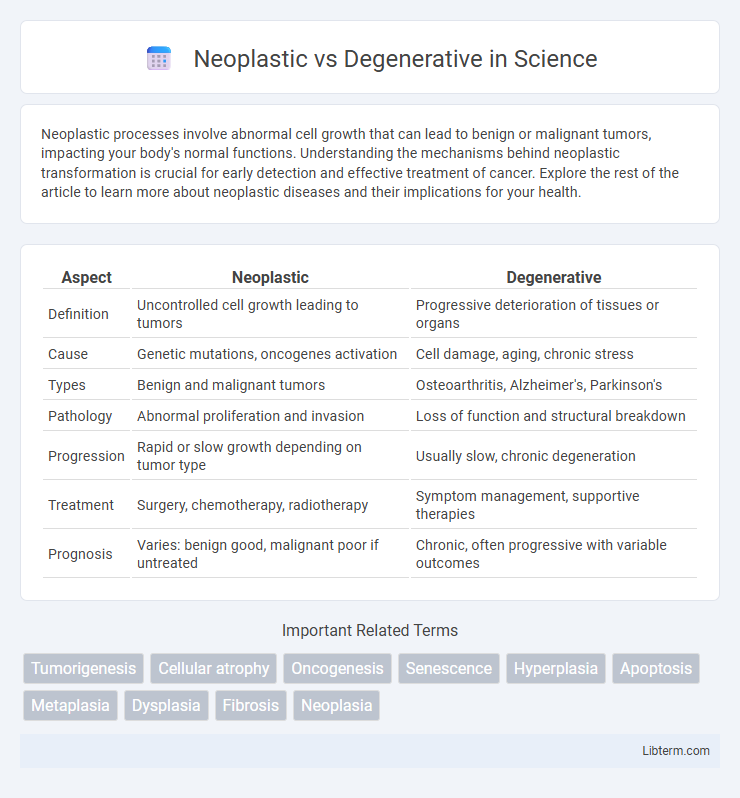Neoplastic processes involve abnormal cell growth that can lead to benign or malignant tumors, impacting your body's normal functions. Understanding the mechanisms behind neoplastic transformation is crucial for early detection and effective treatment of cancer. Explore the rest of the article to learn more about neoplastic diseases and their implications for your health.
Table of Comparison
| Aspect | Neoplastic | Degenerative |
|---|---|---|
| Definition | Uncontrolled cell growth leading to tumors | Progressive deterioration of tissues or organs |
| Cause | Genetic mutations, oncogenes activation | Cell damage, aging, chronic stress |
| Types | Benign and malignant tumors | Osteoarthritis, Alzheimer's, Parkinson's |
| Pathology | Abnormal proliferation and invasion | Loss of function and structural breakdown |
| Progression | Rapid or slow growth depending on tumor type | Usually slow, chronic degeneration |
| Treatment | Surgery, chemotherapy, radiotherapy | Symptom management, supportive therapies |
| Prognosis | Varies: benign good, malignant poor if untreated | Chronic, often progressive with variable outcomes |
Introduction to Neoplastic and Degenerative Disorders
Neoplastic disorders involve abnormal and uncontrolled cell growth leading to tumors, which can be benign or malignant, affecting various tissues and organs. Degenerative disorders are characterized by the progressive loss of structure or function of tissues, commonly seen in conditions like osteoarthritis and neurodegenerative diseases such as Alzheimer's. Understanding the distinct pathophysiology of neoplastic versus degenerative disorders is crucial for diagnosis, treatment, and prognosis in clinical practice.
Defining Neoplastic Diseases
Neoplastic diseases involve abnormal and uncontrolled cell growth forming tumors, either benign or malignant, characterized by genetic mutations that disrupt normal cell cycle regulation. These disorders contrast with degenerative diseases, which primarily result from progressive tissue deterioration and loss of function without abnormal cell proliferation. Understanding neoplastic processes focuses on identifying oncogenes, tumor suppressor gene alterations, and the microenvironment that facilitates cancer progression.
Understanding Degenerative Conditions
Degenerative conditions involve the gradual deterioration of tissues or organs, often linked to aging or chronic wear, such as osteoarthritis, Alzheimer's disease, and Parkinson's disease. Unlike neoplastic disorders, which are characterized by uncontrolled cell growth forming tumors, degenerative diseases typically result from progressive loss of function and structural integrity. Understanding the molecular mechanisms and risk factors of these conditions is crucial for developing effective treatments and improving patient outcomes.
Key Pathological Differences
Neoplastic conditions involve uncontrolled cellular proliferation forming benign or malignant tumors, characterized by atypical cell morphology, abnormal mitotic figures, and potential metastasis. Degenerative diseases primarily result from progressive loss or dysfunction of cells and tissues, often related to aging, with hallmark features including tissue atrophy, decreased cellularity, and accumulation of metabolic waste products. Unlike neoplastic pathology, degenerative changes lack clonal cell expansion and typically do not exhibit invasive growth or anaplasia.
Etiological Factors: Neoplastic vs Degenerative
Neoplastic etiological factors primarily involve genetic mutations and uncontrolled cellular proliferation leading to tumor formation, often triggered by carcinogens, radiation, or viral infections. Degenerative etiologies focus on progressive cellular deterioration due to aging, oxidative stress, protein misfolding, and metabolic imbalances, commonly seen in neurodegenerative diseases like Alzheimer's and Parkinson's. Distinguishing these factors is crucial for targeted treatment strategies in oncology versus degenerative disorder management.
Clinical Manifestations and Symptoms
Neoplastic conditions often present with progressive mass effects such as localized pain, neurological deficits, and unexplained weight loss, reflecting tumor growth and invasion. Degenerative diseases typically manifest through chronic symptoms like joint stiffness, decreased range of motion, muscle weakness, and gradual functional decline due to tissue deterioration. Both conditions may share overlapping features like pain and mobility impairment but differ in onset speed, with neoplastic symptoms emerging rapidly and degenerative symptoms progressing slowly over time.
Diagnostic Approaches and Techniques
Neoplastic diagnostic approaches prioritize imaging modalities such as MRI and CT scans to identify tumor masses and assess malignancy, often supplemented with biopsy and histopathological examination for definitive diagnosis. Degenerative conditions are primarily diagnosed through clinical evaluation, radiographic imaging like X-rays and MRI to detect structural changes, and laboratory tests to rule out inflammatory or metabolic causes. Advanced techniques such as PET scans and molecular markers assist in differentiating neoplastic from degenerative processes in complex cases.
Treatment Strategies and Prognosis
Neoplastic treatment strategies often involve surgical resection, chemotherapy, and radiotherapy tailored to tumor type and stage, with prognosis heavily dependent on malignancy grade and early detection. Degenerative conditions focus on symptom management, physical therapy, and sometimes surgical intervention to slow progression and improve quality of life, with prognosis varying widely based on disease severity and patient response. Understanding the pathological basis is crucial for optimizing clinical approaches and predicting functional outcomes in both neoplastic and degenerative diseases.
Recent Advances in Research
Recent advances in research have increasingly differentiated neoplastic processes, characterized by abnormal cellular proliferation seen in cancers, from degenerative diseases, which involve progressive loss of function and structure in tissues such as neurons or cartilage. Cutting-edge genomic and proteomic techniques have enabled precise identification of molecular pathways driving neoplastic growth, while novel imaging and biomarker studies have enhanced early detection and monitoring of degenerative conditions like Alzheimer's and osteoarthritis. Emerging therapeutic strategies are now targeting specific genetic mutations in tumors and modulating inflammatory and apoptotic pathways implicated in degenerative diseases, offering promising avenues for personalized medicine.
Summary and Future Perspectives
Neoplastic conditions involve uncontrolled cellular proliferation leading to tumor formation, while degenerative diseases are characterized by progressive tissue deterioration and loss of function. Advances in molecular diagnostics and targeted therapies are improving the differentiation and treatment of these conditions, with ongoing research exploring biomarkers and regenerative medicine for early detection and intervention. Future perspectives emphasize personalized medicine approaches and integrative strategies to address complex pathophysiological mechanisms underlying neoplastic and degenerative disorders.
Neoplastic Infographic

 libterm.com
libterm.com